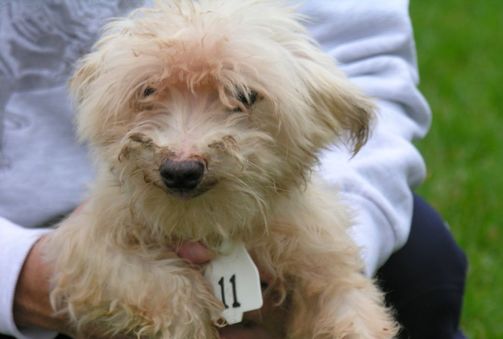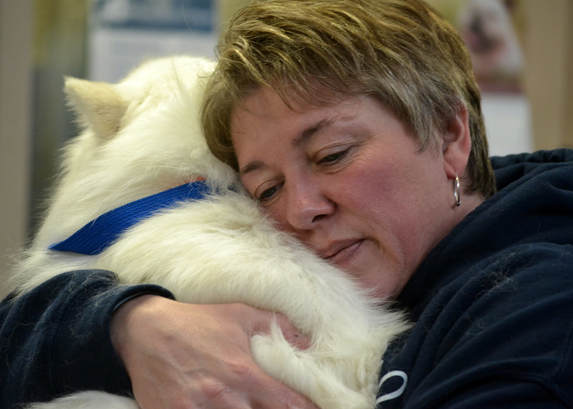|
In November of last year, I wrote a blog called "Rescuers at Dog Auctions - Please, Stop." The blog received a lot of attention and not all of it was good. I knew that some in the animal rescue community would not take kindly to my position. I honestly expected a great deal of hostility from some rescuers and I was not at all surprised by their negative reaction. My hope was to reach ordinary, animal loving people who may not be aware of the topic and who may unwittingly be complicit in the behavior through well-intended donations. The concept is fairly simple. There are organizations and individuals which breed dogs and which then sell them at auctions, much like a livestock auction or an auction of farm equipment. Dog auctions are held in a variety of places. The most well known dog auctions are held by Southwest Auction Service in Wheaton, Missouri. The next dog auction is being held this Saturday - October 7th. Looking at the schedule, four more dog auctions will be held before the end of the year after the one being held on Saturday. There was a time when the people at dog auctions were other breeders and were brokers who were there to buy dogs to be sold in pet stores across the country. Make no mistake - this has always been big business and it is fueled by one thing: our willingness to buy dogs in pet stores. Millions of dogs are bred each year to meet public demand and millions of dollars change hands in the process. I have never been to an dog auction, but I have numerous sources and contacts who have and their first-hand accounts are good enough for me to not only have an opinion about the auction process in general terms, but to have an opinion on how that process has changed - for the worse - due to people in the animal rescue community. My sources have decades of combined experience in interacting with commercial breeders and with the auction houses themselves. They have been around long enough to see the evolution of the industry based on sweeping changes brought about by good intentions, but which have made matters worse. Many of them have been involved for decades in seeking legislation to regulate the dog breeding industry, to make auctions illegal and to ensure better conditions for the "breeder stock" and the puppies they produce. As I wrote in my earlier blog, there was a time as recently as 10 years ago when the presence of rescuers and rescue groups at dog auctions was not the norm in most regions. Most of those present at auction were breeders who were at the auction to buy dogs to add to their businesses. During this time, it was not uncommon for some in rescue get dogs for free, to get "dollar dogs" or to get large numbers of dogs for small amounts of money (i.e., 50 dogs for $3. Yes you read that correctly). That all changed not quite 10 years ago in the Great Lakes region and about 6 years ago in the Midwest. Rescuers had an increasing presence at auction and were often easy to spot from the way they dressed, the way they behaved and the amount of money they were willing to spend on dogs. The presence of rescuers at auction is now extremely obvious to both the auction companies and to the breeders who are both fascinated by and repelled by the rescuers’ behavior in terms of how much money they are willing to spend to "rescue" dogs. I have heard the arguments of many in the rescue community to the effect that buying dogs at auction is a noble cause and that it is all about the dogs. I recently read an article written by a rescuer who equated the dogs she and her peers buy at auction as machines. She said the breeding dogs are the machines and the puppies are the products. She wrote that when she and others like her buy dogs at auction, they are taking a machine out of the production process and that dog will no longer be objectified or mistreated in the course of producing puppies. This argument is not only incredibly short-sighted. It is simply wrong. Yes, there are some dogs "in the system" at "puppy mills" or in large commercial dog breeding operations who are not treated well. Some are outright abused. Yes, it is noble to seek to get those dogs out of the system to end their lives of imprisonment and servitude and to rehabilitate them to put them into loving, compassionate homes. But when money is paid by rescue groups for those dogs in amounts which far exceed what any other bidder would pay, three things happen: - a dog has been removed from the breeding operation and will more likely than not go on to lead a wonderful life in a new home(if the dog has been neglected, has serious health issues and is not socialized to people, the rehabilitation process can take a long time and many well-meaning adopters may not understand the challenges they will face) - more money has been paid for that dog than would have been paid by non-rescue bidders at the auction (in some cases these amounts are many times what another breeder would have paid for a dog) - the dog which is no longer part of the breeding operation will be replaced by a better, younger or more healthy dog The first of those three things is great. I would love nothing more than for all dogs currently being used as part of a breeding operation to be freed, rehabilitated and to go on to live lives of luxury and be spoiled rotten. That is not a realistic idea at this juncture simply because the business is so huge and because it is fueled by us and our demand for dogs. It is the second and third things which are the issue. The money paid for the dog at the auction simply serves to enrich the breeding operation and the dog bought by the rescuer will be replaced with at least another dog if not more than one dog. It cannot be denied that the presence of rescuers at auction has changed the industry. Breeders send dogs to auction because they are done breeding them (they are no longer profitable), because they can't sell them directly to consumers and/or because they know they can get more money at auction than anywhere else. As I wrote about last year, there are now breeders who produce puppies of certain breeds specifically to sell to rescuers at auction. The solution to me is simple even if some people get emotional about it. The dogs who are in the commercial breeding industry now are already there. Some are well cared for. Many are not. If we want to end what many call "puppy mills" or better regulate the commercial dog breeding industry, the way to do that is through endorsing legislation which sets standards for the care of the dogs and to stop buying the products in pet stores. And in auction tents. I understand we feel badly for those dogs in the system, particularly those who have not been treated well. We see them as victims and we should. But when rescuers buy them at auction and call it rescue, we are simply ensuring the industry will be more profitable than ever and we are ensuring that dogs we do not see will take their place. It is a fallacy to think that by purchasing a dog at an auction, no other dog will be negatively impacted. Animal rescue is very much about helping animals in need, many of whom are in our antiquated sheltering system and who are at risk of death every day in all but the most progressive communities. If you are a rescuer, or you financially support a rescue group, please focus on those dogs in need in the animal shelter in your own community or in another community. If yours is a breed specific rescue and the demand of your followers for the breed of choice is so great it cannot be met through saving shelter dogs or other dogs of that breed needing to be re-homed for some reason, consider expanding your rescue organization to also help other dogs of a similar size or look. You may be surprised to learn that many people think they want a particular breed, but are willing to adopt another breed of dog in order to save the dog's life. Please, rescuers, just stay away from auctions. Please. And donors, please do not financially support those who buy dogs at auction. You may think you are doing something noble and just. But you are not. If you are intent on having a dog which came from a puppy mill for some reason, connect with an organization which does not buy dogs at auction and which instead gets dogs relinquished to the organization for free by breeders and auction houses with no money changing hands. (Note - at the time I was writing this blog, I learned that the City of Dothan, Alabama, was planning to auction off a number of dogs which had been seized from a local dog breeding operation. The dogs had been spayed/neutered and vetted and I am told that this was done as a fundraising effort toward building a new shelter. I opposed the auction decision; a lottery would have been another way to raise money from the community while raising awareness about all shelter dogs. A number of people in the rescue community who regularly buy dogs at auction in Missouri spoke out against the Dothan auction, but they attended anyway. I had hoped they were attending for research purposes. They bought dogs as intermediaries for other rescue organizations, in some cases outbidding locals who had hoped to adopt the dogs.) (images courtesy of PetShopPuppies and National Mill Dog Rescue)
0 Comments
Your comment will be posted after it is approved.
Leave a Reply. |
AuthorI am an animal welfare advocate. My goal is to help people understand some basic issues related to companion animals in America. Awareness leads to education leads to action leads to change. Archives
July 2024
Categories
All
image courtesy of Terrah Johnson
|



 RSS Feed
RSS Feed